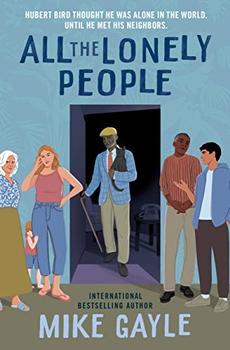Summary | Excerpt | Reading Guide | Discuss | Reviews | Beyond the book | Read-Alikes | Genres & Themes | Author Bio

Mike Gayle's charming novel All the Lonely People introduces us to Hubert Bird, an 82-year-old widower who lives alone in Bromley (a London borough) with just his cat for company. He leads an isolated existence, his only meaningful contact a weekly phone call with his daughter, Rose, who moved to Australia nearly 20 years prior. This starts to change when single mother Ashleigh moves in next door with her toddler, Layla. The effervescent young woman is determined to know her neighbors, and as Hubert reluctantly lets her into his life, his world changes in ways he couldn't have imagined.
Alternating with this storyline is the tale of Hubert's past, beginning with his departure from Jamaica when he was in his early 20s. Part of the "Windrush generation" (see Beyond the Book), Hubert joins his friend Gus in England as a low-wage laborer, and over the ensuing years marries, has children and generally prospers.
This delightful work is almost two books in one. The section set in the present reads like a fable or fairytale; it's a feel-good story, a pleasant read that speaks to the theme of loneliness. And it's certainly timely; our society has become increasingly insular, encouraging one to have many "friends" on social media platforms without truly knowing much about them or interacting with them beyond the screen. There seem to be fewer opportunities to develop relationships, as well; in many areas, community gatherings are less common, many haven't met their neighbors, families are often geographically dispersed. And, of course, the pandemic has brought distance, both physical and emotional. As Hubert and Ashleigh combat this phenomenon of isolation, the author gives us a roadmap of how to reverse the trend — in our own lives and the lives of those around us.
Gayle states in a Q&A that he set out to write a book about "how someone's life fills and then empties again," and the chapters set in the past accomplish that goal remarkably well. These feel realistic, as Hubert faces hurdles he must overcome to prosper in his adopted country; his life is good by many standards but far from idyllic. Along the way, the author tackles complex themes such as racism, drug abuse and grief, among others, and the unexpected depth here is what transforms the book from a light-but-forgettable read into a satisfying and memorable one.
Gayle's characterization is exceptional; certainly Hubert, Ashleigh and Hubert's wife Joyce are fully fleshed out, with Hubert in particular eliciting readers' sympathies, but even the author's minor characters are often complex. The other "lonely people" who appear throughout the novel are quirky, but not to such an extent that they seem like caricatures. There are those who are less distinctly drawn — largely bullies Hubert encounters — but since each serves as a representation of the type of bigot a Black immigrant might encounter, the fact that they're stereotypes makes literary sense.
There are a few moments some may find a little manipulative — plot points inserted more to tug on readers' heartstrings than because they make sense — but I doubt most will mind. The book is compulsively readable and its characters so loveable it's easy to gloss over its minor flaws.
All the Lonely People is likely to find a wide audience; with its focus on overcoming loneliness, it feels like the right book at the right time, sure to resonate with many. Its generally upbeat tone and overarching sense of optimism make it an exceptionally satisfying read. Book groups will find it great for discussion, and BookBrowse's own book club is discussing it online.
![]() This review
first ran in the September 21, 2022
issue of BookBrowse Recommends.
This review
first ran in the September 21, 2022
issue of BookBrowse Recommends.

If you liked All the Lonely People, try these:

by Shelby Van Pelt
Published 2025
Winner of the 2022 BookBrowse Debut Award
For fans of A Man Called Ove, a charming, witty and compulsively readable exploration of friendship, reckoning, and hope that traces a widow's unlikely connection with a giant Pacific octopus.

by Anne Tyler
Published 2025
A new Anne Tyler novel destined to be an instant classic: a socially awkward mother of the bride navigates the days before and after her daughter's wedding.
Your guide toexceptional books
BookBrowse seeks out and recommends the best in contemporary fiction and nonfiction—books that not only engage and entertain but also deepen our understanding of ourselves and the world around us.